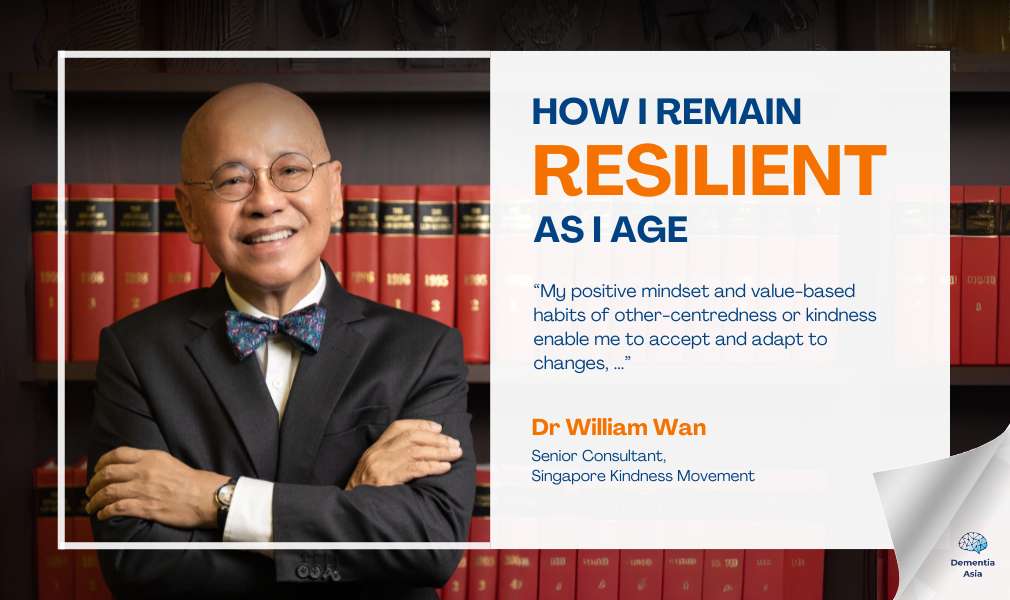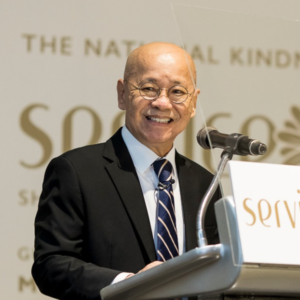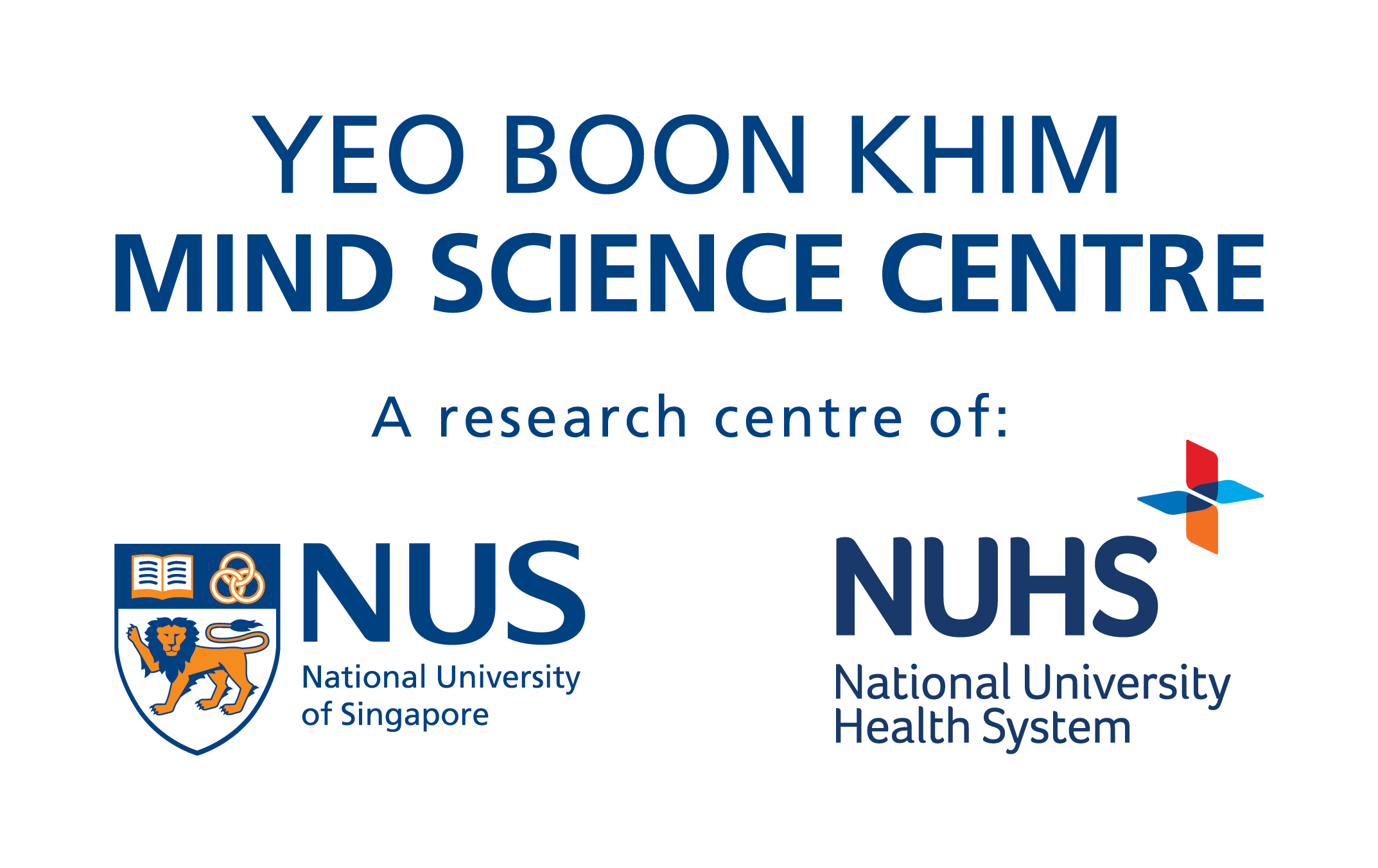How I Remain Resilient As I Age
A column written by Dr William Wan, Senior Consultant of the Singapore Kindness Movement

I am 77 and I accept the reality that I have aged. My energy level is not the same as when I was 73. At 73 I did a hundred push-ups to raise money for charity. Today, I am not able to do that.
As I write, I am suffering from a case of pinched nerve. It is taking a tad longer to heal but I am taking it in my stride. I am also suffering from MDS or Myelodysplastic Syndromes, a pre-leukemia condition. I am not about to die, but I might in about 10 years.
I accept the reality that as I age, my health issues multiply.
But I am still fit enough to continue to contribute whatever I can. Hence I am not retired to wallow in self-pity. On the contrary, I am refired to live purposefully. I remain resilient because I choose to have the following mindset.
- I choose to look at everything positively. A positive mindset is a growth mindset. A growth mindset is a flexible mindset. I view health and other challenges as opportunities to grow my resilience as I adapt to new realities in the changes that come with ageing. I focus on what I can control and not on what I can’t.
- I exercise regularly. I do stretches and more cardiovascular exercises like walking my 10k steps 5 times a week. Some tension exercises are good for maintaining muscle mass to retain strength, flexibility, and balance. They help fuel my energy level in spite of my age.
- I eat healthily. I am not a foodie and I eat to live. These days I am eating less carbo and sugary food. I am on an intermittent fast where I skip breakfast – it has conditioned my body to expect only two meals a day. My diet is rich in fruits, vegetables, lean proteins, and whole grains and nuts, supplemented by vitamins and minerals.
- I live pro-socially surrounded by scores of friends from all walks of life. Maintaining my social connections through social media, I am able to reach out to hundreds of friends, who are engaged with me regularly. I am also keeping in touch with family and friends through my ministry in churches and the public space, in chat groups and small groups.
- I am a life-long learner, full of curiosity and wonder. I stay mentally active through reading, watching documentaries and thought-provoking movies, listening to podcasts and videos, and engaging in meaningful conversations about controversial subjects. I love a game of scrabble, and other word games, and enjoy writing and speaking on matters of the heart.
- I have an attitude of gratitude. This is my secret of general contentment where I enjoy what I already have rather than crave for what I do not have. I start my morning by walking my 10k steps while listening to 15 minutes of songs of thankfulness and 30 minutes of uplifting talks and sermons. I contemplate and give thanks to God for people I know and pray for world peace and purposeful interactions for the day before me. This is the way I meditate and receive the energy I need for the rest of the day.
- I let passing things pass. It is the awareness that all things pass – nothing is permanent, all things are transient – that I need to let go and not be attached to anything that is negative, unnecessary, or distractive. I have a singular purpose in life, namely, to love God and my neighbour. Anything that does not contribute to my purpose is superfluous. I learned to forgive, let go of any resentment and other negative emotions and focus on the positive energy that contributes to a better world.
This is how I remain resilient as I age. My positive mindset and value-based habits of other-centredness or kindness enable me to accept and adapt to changes, bounce back from adversities to continue to flourish.
- Adaptability and Positive Outlook:
-
-
- Ong, A. D., & Bergeman, C. S. (2004). Resilience and adaptation to stress in later life: Empirical perspectives and conceptual frameworks. Ageing International, 29(3), 219-246.
- Scheibe, S., & Carstensen, L. L. (2010). Emotional aging: Recent findings and future trends. The Journals of Gerontology Series B: Psychological Sciences and Social Sciences, 65B(2), 135-144.
-
- Physical Activity:
-
-
- Paffenbarger, R. S., Lee, I. M., & Leung, R. (1994). Physical activity and personal characteristics associated with depression and suicide in American college men. Acta Psychiatrica Scandinavica. Supplementum, 377, 16-22.
- Taylor, D. (2014). Physical activity is medicine for older adults. Journal of Aging and Physical Activity, 22(3), 389-399.
-
- Diet and Nutrition:
-
-
- Sofi, F., Abbate, R., Gensini, G. F., & Casini, A. (2010). Accruing evidence on benefits of adherence to the Mediterranean diet on health: An updated systematic review and meta-analysis. The American Journal of Clinical Nutrition, 92(5), 1189-1196.
- Chrysohoou, C., Panagiotakos, D. B., Pitsavos, C., Das, U. N., & Stefanadis, C. (2004). Adherence to the Mediterranean diet attenuates inflammation and coagulation process in healthy adults: The ATTICA Study. Journal of the American College of Cardiology, 44(1), 152-158.
-
- Social Connections:
-
-
- Waldinger, R. J., & Schulz, M. S. (2010). What’s love got to do with it? Social functioning, perceived health, and daily happiness in married octogenarians. Psychology and Aging, 25(2), 422-431.
- Glass, T. A., De Leon, C. M., Bassuk, S. S., & Berkman, L. F. (2006). Social engagement and depressive symptoms in late life: Longitudinal findings. Journal of Gerontology: Social Sciences, 61(6), S276-S282.
-
- Mental Well-being:
-
-
- Lenze, E. J., & Wetherell, J. L. (2011). A lifespan view of anxiety disorders. Dialogues in Clinical Neuroscience, 13(4), 381-399.
- Park, D. C., & Bischof, G. N. (2013). The aging mind: Neuroplasticity in response to cognitive training. Dialogues in Clinical Neuroscience, 15(1), 109-119.
-
- Purpose and Goals:
-
- Hill, P. L., & Turiano, N. A. (2014). Purpose in life as a predictor of mortality across adulthood. Psychological Science, 25(7), 1482-1486.
- Thoits, P. A., & Hewitt, L. N. (2001). Volunteer work and well-being. Journal of Health and Social Behavior, 42(2), 115-131.

This article was contributed by Dr William Wan, 77, the previous General Secretary of the Singapore Kindness Movement. Passionate about making a difference to Singapore, Dr Wan contributes to several non-profit organisations and is also an advocate of active ageing. He sums up his journey thus far as such:
“A life lived in multiple chapters – from adversarial litigation to mediating kindness. Now breaking the silver ceiling with spring in the autumn of my life.”
